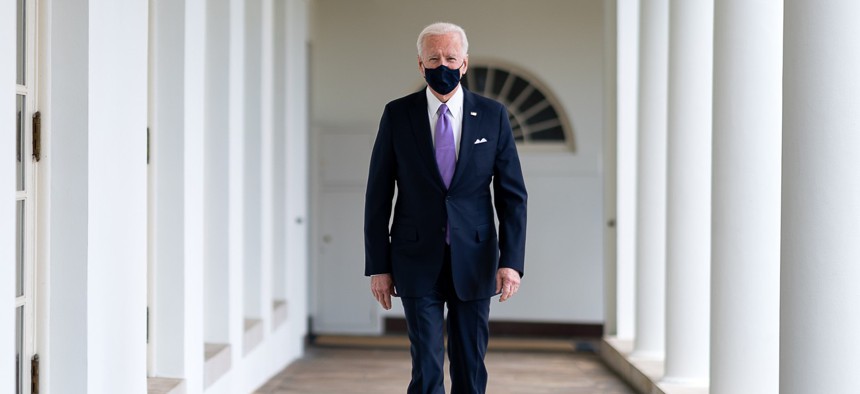
Lawmakers want to reign in executive branch control over spending. Official White House Photo by Adam Schultz
Lawmakers Look to Crack Down on White House's Discretion in Allocating Agency Funding
Democrats decry "unelected officials" who make spending decisions in communities they do not understand.
Lawmakers are renewing their push to restrict the flexibility the executive branch has in allocating and revoking federal funding, looking to claw back their power of the purse after what they identified as abuses by recent administrations.
The House Budget Committee held a hearing on strategies to reassert Congress' power, with a panel of government and outside watchdogs largely agreeing that reforms are necessary. Lawmakers noted that "cornerstone" spending laws such as the Antideficiency Act and the Impoundment Control Act are toothless as the executive branch has ignored legal decisions issued by the Government Accountability Office to enforce them. The White House and agencies have issued interpretations of the laws that give themselves far more latitude than Congress ever intended to provide, the lawmakers said.
Democrats on the committee, led by Rep. John Yarmuth, D-Ky., promoted their Protecting Congress' Power of the Purse Act, which would require the Office of Management and Budget to make public its apportionments of funding provided by Congress. The current lack of transparency limits congressional oversight and hinders agency officials seeking reliable information, they said. The measure would give GAO more authority in investigating executive branch spending and amend the rescissions process to prevent the White House from simply running out the clock on congressionally authorized funding. OMB would be required to release funding to agencies no later than 90 days before the money would expire.
It would also seek to add teeth by creating new punishments for spending law violators. "Responsible officials" for violations of the rescissions law, as determined by GAO, would be subject to administrative discipline.
Edda Emmanuelli Perez, GAO’s deputy general counsel, stressed at the hearing on Thursday that under current law her agency’s only role is to help Congress provide oversight, rather than actually enforce the law.
“The role of GAO is really to help Congress in its constitutional power of the purse,” Perez said, adding that GAO aims to ensure “Congress can carry out the laws” and “make changes that it sees fit.”
Molly Reynolds, senior fellow at The Brooking Institution, said there will always be some discretion on spending at the agency level, but that only reinforces how critical it is for Congress to tighten its oversight.
“The individuals charged with executing federal programs on a daily basis—from agency heads down to career civil servants—will always encounter situations in which the language of the law does not provide sufficient guidance,” Reynolds said.
Sen. Patrick Leahy, D-Vt., who chairs the Senate Appropriations Committee, said on the floor Thursday in a speech defending earmarks that federal employees directing spending allocations are too far removed from outcomes to make informed decisions.
“These unelected officials are dedicated public servants to be sure, but they cannot possibly understand the needs of our communities to the extent that senators do,” Leahy said. “To them, a new community center is nothing more than a line item on a spreadsheet. To us, we know the potential such a community center can unlock, because we have spoken to the organizers who want to build it.”
Lawmakers on both sides of the aisle pointed to recent incidents directed by their political opponents in the White House to highlight the overly broad flexibility the executive branch has to withhold funding. Democrats highlighted President Trump’s withholding of aid to Ukraine, which ultimately led to his impeachment. Republicans pointed to President Biden’s day-one decision to pause funding for the wall along the U.S.-Mexico border, which Perez noted GAO immediately began reviewing for a potential spending violation. Yarmuth emphasized he would like to see tighter restraints on White House spending discretion no matter who is in the Oval Office.
Liz Hempowicz, director of public policy at the Project on Government Oversight, said Congress' authority over spending has diminished and the current latitude afforded to OMB leaves significant "potential for abuse.” She recommended OMB allow for greater oversight of its apportionment process, provide justifications for its specific allotments and allow more time for agencies to disburse funds.







